Oct. 14, 2021
Events : JoRC
This scientific event is placed under the scientific responsibility of Marie-Anne Frison-Roche and Arnaud van Waeyenberge. It is organized by the Journal of Regulation & Compliance (JoRC) and by the Centre Perelman of Brussels University.
This event is part of the 2021 colloquia cycle around the general theme of Compliance Jurisdictionalisation.
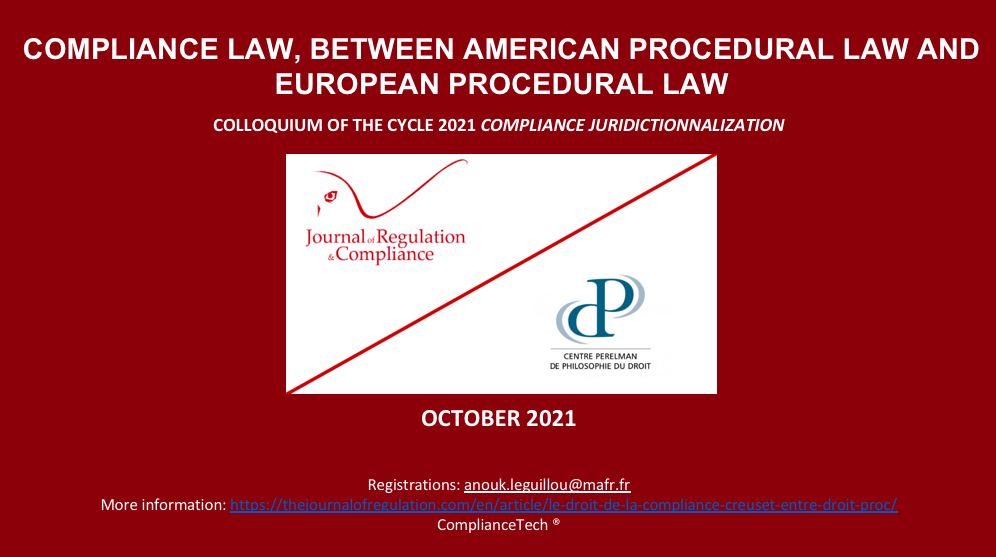
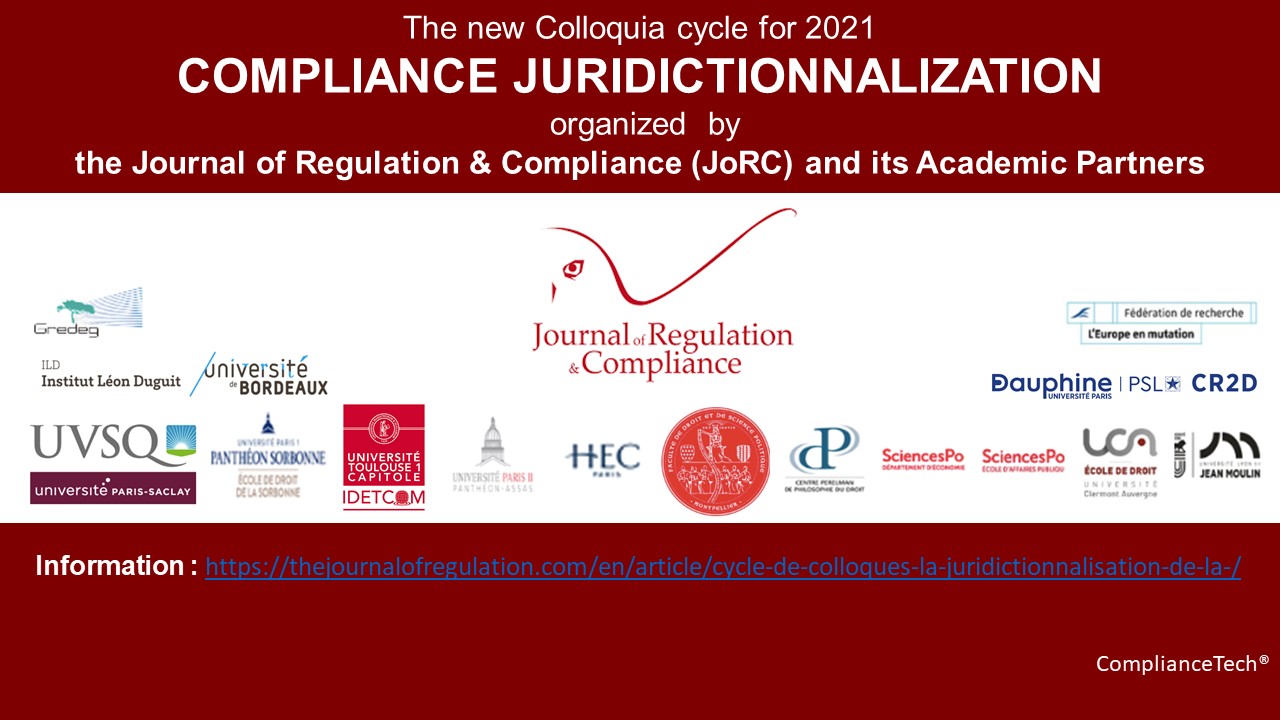
The different interventions will be then transformed into contributions in the books La juridictionnalisation de la Compliance and Compliance Juridictionnalization which will be published in the Regulation & Compliance serie, jointly published by the JoRC and Dalloz for the book in French and by JoRC and Bruylant for the book in English.
This colloquium will take place in Brussels in October 2021.
Presentation of the theme:
Notably will speak:
- Marie-Anne Frison-Roche, professor at Sciences Po - Paris
- Arnaud van Waeyenberge, professor at HEC Paris and researcher at Centre Perelman
Read a detailed presentation of the colloquium below:

June 22, 2016
Breaking news

It is sometimes argued that the competitive freedom will destroy the "old regulated world", platforms being the perfect example of this fresh wind, the invention of the adjective "disruptive" which could express a "novelty" before which it is only suitable to bow.
It would be therefore necessary to smile or even laugh, what would be a "rearguard battle" when the Conseil Constitutionnel (French Constitutional Council) in a decision of 22 May 2014 had limited the expansion of Uber, protecting the correspondingly monopoly holders of a municipal taxi license.
But in the US, cities adopt regulations. So on the next city council of the city of Chicago, will be proposed the vote of an order to compel the rideshare drivers.
In 2014, the French Constitutional Council justified its decision by referring to "the public order of parking", which the municipality is mistress... The justification given here is to protect the occupant.
Indeed all rideshare drivers will be obliged provide proof that they are subject to health checks, especially on drugs and provide criminel check also.
This is justified because Regulation of an activity implies control of those who exercise it and equal competitors can justify that for the same activity some are removed, especialy in view of the protection of the person transported.
The third new requirement is of a different nature: the driver must prove that it is not in debt to the municipality. Why not, since the infrastructure of the city allows them to exercise the economic activity in question. This is another underlying objective, which lies rather in the idea of an exchange between the city and the one who transports people, the beneficiary of infrastructure should not be otherwise debtor that it enjoys public infrastructure.
The latter provision shows that the "contract" is increasingly not between the carrier and transported - via the virtual platform - but between the very concrete public space and one that circulates and do not live there.

Feb. 27, 2015
Bibliographic Reports
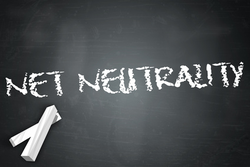
Le 26 février 2015, la Federal Communication Commission, régulateur des communications aux États-Unis impose le principe de "l'Internet ouvert", les gestionnaires du réseau ne pouvant interférer que pour des raisons techniques et non plus commerciales.
C'est un pas décisif, montrant la dimension politique de la Régulation.
En effet, la question est politique. Et le politique a gagné par la Décision qu'a adoptée la Federal Communication Commission en posant le principe d'un "Internet ouvert", forme publique du principe politique pur qu'est la "Neutralité du Net".
Internet est un espace dans circulent de très nombreuses richesses qui sont l'objet de désirs de consommation. Pour que celui qui fait les consommer y procède, il doit d'abord arriver jusqu'au produit virtuel, stocké dans l'espace virtuel, c'est-à-dire circuler sur l'espace virtuel. Il doit donc faire un double acte de consommation, le premier étant l'achat de circulation dans l'espace (circuler plus ou moins vite et plus ou moins bien), le second étant l'achat de consommation du bien (voir le film, par exemple). L'enjeu majeur, dans ce qu'il est convenu d'appeler "l'économie de l'accès" est désormais constitué des conditions du premier acte de consommation.
Face à cette réalité, un choix s'offre : soit laisser faire les mouvements des offreurs et des demandeurs, soit intervenir politiquement par une invention juridique, le droit étant l'arme du politique (I). Le choix ayant été fait d'aller vers le politique par l'affirmation de l'Internet ouvert, la mise en oeuvre du principe au regard des contraintes d'investissement par les opérateurs ne va pas être aisée (II). Dès lors, et comme depuis le départ, la question va sans doute continuer à être judiciaire (III).
Feb. 23, 2015
Breaking news

The theme of the relationship between regulation and innovation finds every day new illustrations. The example of the drone is particularly noteworthy.
Indeed, the drone is a technical object that moves in the air without being driven in an immediate way by the hand of man.
The legal mechanism of qualification brought the drone in the category of "aircraft" and submit it to the regulatory power of the civil aviation regulator.
The regulation of civil aviation is primarily a safety regulation, not a regulation of the sector's economic deployment.
This is why regulators have taken restrictive positions on drones used for commercial purposes, to the extent that the presence of human beings, most the pilots, are the condition for the safety of people. The fact that the drones fly with "no one" led to consider as a danger a prior, which led regulators to take restrictive measures on flying drones for commercial purposes, restricton consistent with the regulator's intervention criteria, without taking into account external rules, such as the protection of privacy.
But whatever the sector, regulators see themselves increasingly as economic regulators. If we adopt this perspective, a restrictive approach appears to be nonsense.
In the interests of balance in both approaches, the safety of people and the economic development through innovation, the US civil aviation regulator, the Federal Aviation Administration is developing new rules.
February 11, 2015, Federal Aviation Administration raised the need for a legal framework for commercial drones. The reason for this is economic. As it writes: "It is anticipated that this activity will result in significant economic benefits". Indeed, Article 333 of the 2012 ACT of modernization and reform imposes registration procedure for every commercial unmanned flying object in the sky!footnote-28. But this hinders business development, and therefore the incentive to technical innovation drone.
It was necessary to find a balance between security of persons and lifting of barriers to economic development. This is why the FAA will distinguish between "small" and other drones. The former are particularly useful in agriculture. To the extent that the former do not constitute danger to persons, an exemption from this procedure (Article 333 exemption) may be given concerning them.
One can analyze this evolution of air Regulation in two ways. First, it is for air regulator to take into account fundamental innovation of flying machines with "no one": innovation will be the base of a huge market for which strict regulatory rules could have been the troublemaker. The consideration of the safety of people remains since only drones "small" are allowed. In addition, they will have to remain at low level and away from airports and housing.
Second, the Regulator reacts by pragmatism. The ban on commercial flight drones hasn't prevented investment in this area. So far, the regulator had instead chosen not to react to the open violations of the standards, from the moment that the safety of the people wasn't in danger. The idea of the new conception is to promote this new market by putting the rules protecting the physical safety of people.

Feb. 17, 2015
Translated Summaries : 05. Energie
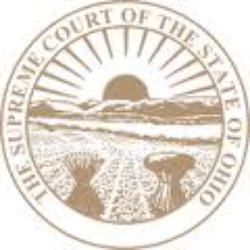
In regulatory law, municipalities are very important, as consumers but also as issuers standards. They can do this through contracts but also by unilateral standards such orders.
This power of municipalities is coming to a halt by the decision taken 17 February 2015 by the Supreme Court of the State of Ohio,, State of Ohio ex rel. Jack Morrison Jr., Law Director for City of Munroe Falls, Ohio v. Beck Energy Corp.
Indeed, a municipal law had made provisions for imposing rules on location, drilling and well operations and gas. These provisions were contrary to the law of the State of Ohio.
In its judgment of 17 February 2015, the state Supreme Court considers that this is enough to make the first non-compliant text of the Constitution because it is not possible for a local authority to exercise normative power by contradicting a state standard.
The stakes are certainly legal and lies in the implementation of the hierarchy of norms. But it is also political: in energy, due to the power of the operators, which is most likely not to be captured by the sector? The political power of the state or the political power of municipalities?
As suggested by one of the judges, must be taken into consideration which of the two powers depends most operators in the financing of campaigns.
Factual and determinant consideration, specific element of the US, an element which Kelsen couldn't think .....
Feb. 16, 2015
Bibliographic Reports : Books
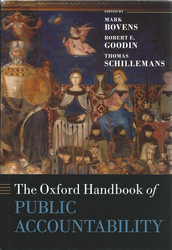
Published by Oxford University Press (OUF), the collective book, Public Accountability, edited by Mark Bovens, Robert Goodin and Thomas Schillemann, consists of 43 contributions.
Few strictly focus on issues of regulatory matters. One can still quote the article by Colin Scott on Independent Regulators or those of Christie Hayne, Steven E. Salterio and Paul L. Posner and Shahan Asif on auditing (Accounting and Auditing; Audit Institutions).
The subject of most of the contributions is rather the necessary renewal of the management of the State, public governance incorporating this new way of "accountability," which explains the book title : itself: Public Accountability. But as we know that the line between public and private is more porous than ever, we can appreciate that the bookk extends its thoughts to the governance of private organizations or non-profit private sector by some contributions.
Indeed, the fact that Accountability is what is common to the Regulation and Governance. This is the first sentence of the book : "Accountability is the buzzword of modern governance".
Probably because of accountability has become a central concept, as shown in the introductory contribution, these are the articles that confront the most general elements such as "time" (Accountability and Time), "crisis" (Accountability for Crise) or "trust" (Accountability and trust), which are the most instructive for the future.
Thus, despite its collective character, the book is very consistent and often takes a critical tone about this invasion of public space by the will of accoutability, the authors emphasizing the "deficits", the failures and especially thet prohibitively expensive of this mechanism.
It would come to regret the simple mechanism of hierarchical rule to which a nostalgic contribution is devoted, which describes how operated the State before we apply to it the State the agency theory.
So it is a practical book, complete, critical and prospective, of great interest.
Dec. 18, 2014
Breaking news

Virtual currency is a perfect example of the difficulties of interregulation: indeed, the bitcoins are currencies created on the Internet, usually to play games, such as poker. Thus intersect banking regulation, banking supervision, regulation and control of the game, Internet regulation itself.
____
Updated: Jan. 5, 2012 (Initial publication: Jan. 5, 2012)
Thesaurus : Doctrine
